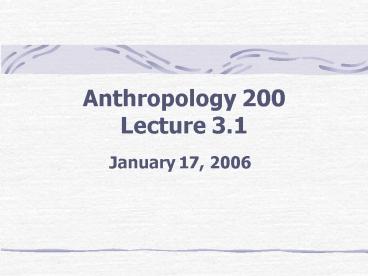Anthropology 200 Lecture 3.1 - PowerPoint PPT Presentation
1 / 15
Title:
Anthropology 200 Lecture 3.1
Description:
http://toby.library.ubc.ca/ereserve/er-coursepage.cfm?id=2182 ... Monogenesis and polygenesis. Johann Blumenbach (1775); All people degenerated from Adam and Eve ... – PowerPoint PPT presentation
Number of Views:146
Avg rating:3.0/5.0
Title: Anthropology 200 Lecture 3.1
1
Anthropology 200Lecture 3.1
- January 17, 2006
2
Website
- Website for Anthropology 200
- http//toby.library.ubc.ca/ereserve/er-coursepage
.cfm?id2182 - Or webpage via the Library Catalogue
- 1. Visit the Catalogue at
- http//webcat.library.ubc.ca/cgi-bin/Pwebrecon.cgi
?DBlocalPAGEFirst2. Select the "Course
Reserve" tab3. At the bottom, in the "Online
Course material search" text field, enter
"anth" and "200".
3
Foundations
- Structures of power and knowledge
- http//www.aaanet.org/committees/coswa/burton.htm
- New questions, new paradigms, new methods
- Continuum of emic and etic approaches
- Origins of the Discipline
- Greek and Romans Xenophon, Herodotus, Tacitus,
Lucretius - Enlightenment thinkers
4
Recurrent Themes
- Relationship btn culture and environment,
biology/race and culture - Classification of societies
- Methodologies cross-cultural comparison
- Change
- Culture as integrated?
- Universal patterns?
5
Enlightenment and Socio-cultural Theory
- John Lockes concept of culture
- Rel. btn human thought and actions environments
create different individuals - Human mind as empty cabinet
- Perfection possible with Reason
- Anne Robert Jacques Turgot
- Enculturation concept 1750
- . . . Genius is spread throughout humankind
somewhat like gold in a mine. The more ore you
mine, the more metal you extract. . . . The
chances of education and circumstances develop
them or let them be buried in obscurity.
6
Enlightenment and Soci-cult Theory, cont
- Classification of societies
- Evolutionary stages
- Divided societies as
- savage, barbarian, and civilized
- Methods
- Cross-cultural comparison of social institutions,
subsistence, etc. - Independent invention
- William Robertson. 1777. The History of America.
7
Enlightenment and Soci-cult Theory, cont
- Viewed change through universal patterns
- H/g society w/ patterned kinship, gvt, etc.
- Same for agricultural society
- Condorcets 10-stage schema invention of
institutions and the state of nature - Mind and historical change rational choices
8
Birth of Anthropology
- Evolutionism as first major school
- Context
- Classification according to racial differences
- Scientific racism
- Human origins
- Monogenesis and polygenesis
- Johann Blumenbach (1775) All people degenerated
from Adam and Eve - All humans with different evolutions
- Charles Darwins Origin of the Species (1859)
9
Darwin and Origin of the Species
- Context
- Key ideas at the time
- races inherently, genetically different
- Adaptive nature of social organization
- Progress as value-laden
- Methods
- Raciology, cephalic index, craniometry Joseph
Gall (1825) and anthropometry
10
Four Evolutionist Approaches Spencer
- Society and Biological // Spencer and Darwin
- Spencers ideas
- survival of the fittest, from biology to
- Progress
- Human perfection
- Society like an organism
- pscyhic unity
- Function and structure
- Social evolution as parallel to biological
- Superorganic ideas extending beyond individual
11
Four Evolutionist Approaches Morgan
- Documenting theories of kinship and society
- Methods
- Comparative method
- Fieldwork
- Surveys
- Publications/Contributions
- Classificatory system of kinship
- 1871 Systems of Consanguinity and Affinity of
the Human Family - Materialist approach stages of human
evolution,socio-cultural patterns, and
technological invention - 1877 Ancient Society
12
Evolutionist Approaches Marx and Engels
- Social change along unilineal trajectory
- Feudalism, capitalism, socialism
- Class struggle as prime mover
- Societies classified by base, structure,
superstructure - Key idea of false consciousness
- Change only possible with Vanguard to direct
working class - The Origin of the Family, Private Property, and
the State (1882) - Drawing on Morgan links btn social org and
kinship, subsistence, etc. - W/ focus on marriage in capitalist societies and
// to prostitution
13
Evolutionist Approaches Tylor
- Background
- 1896 first professor of Anthropology at Oxford
- Primitive Culture (1871)
- On Method of Investigating the Development of
Institutions, Applied Laws of Marriage and
Descent (1889) statistical analysis - Key ideas
- Survivals can reconstruct past through these
- Evolution of understanding the Sacred
- Animism, polytheism, montheism
- Psychic unity human minds the same everywhere,
just less complex expressions of religion
sometimes - Focus on ideational
14
Overview of Evolutionists
- Relation btn Culture and Environment, biology and
culture - Classification unilineal trajectories -etic,
outside perspective - Methods comparative method,scale of
development - armchair anthropology surveys etc.
- Focus on social origins of human institutions,
not theology - Ethnographic present
- Inductive---w/ no participant observation,
interviews, fieldwork - Change with shifts in technology, independent
invention - Culture as not entirely whole, integrated
survivals - Universal patterns of behaviour Nomothetic
principles - Unilineal evolution Although some say Spencer
simply linear evolutionist
15
Historical Particularism
- Defining features
- Culture in the mind
- -emic
- Classification avoided
- Instead wholism
- Methods
- Long-term fieldwork, deductive
- Change through diffusion, interaction
- Historical particularism over universal laws
- Key concepts
- cultural relativism, diffusion, Culture,
historical particularism, -emic and inner mind































